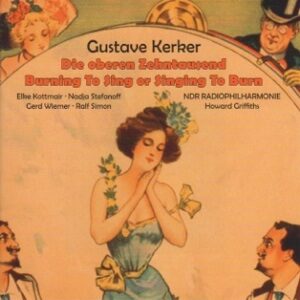Gustave Kerker (1847-1923) was born in Germany, raised in America from childhood, and became in his day a popular musical theater composer and contributor to the development of the American musical. This two-CD set offers a representative sampling of his work. First, there is a large (about an hour) selection from his “American Dance Opera” High Society (Die oberen Zehntausend), which merges the rhythmic vitality of what would become the Broadway musical with the style of German operetta, ca. 1909. It’s relentlessly charming, predictably tuneful, somewhat formulaically scored, and a little of it goes a long way. CPO presents just enough to remain consistently entertaining.
Burning to Sing, or Singing to Burn is a 20-odd-minute operatic parody that’s very cute. A prima donna and her ne’er-do-well husband have a marital spat while their hotel goes up in flames. Much is made of that age-old operatic cliché that has the characters singing about the urgency of doing something while they all stand around doing nothing. There’s “Shall I answer the door?” and “Shall we run for safety?” and the like. It’s fun, and over in a flash. Kerker’s most popular work was his musical comedy The Belle of New York (1897), here represented by an orchestral arrangement of its main tunes.
The performances here are lively and idiomatic, for the most part. All of the singers are quite good, with the single exception of soprano Elke Kottmair, whose vibrato in Singing to Burn really lives up to her name: Madame Marguerita Tremolini. She’s fine, however, in the musical theater numbers in Die oberen Zehntausend, which call for a far less “operatic” technique. Howard Griffiths leads the NDR Radiophilharmonie with an obsessive cheerfulness that suits the music to a tee, and the whole production is excellently engineered.
The booklet notes attempt to make the case for Kerker’s importance as a major precursor of, and contributor to, the Broadway Musical, but I’m not entirely convinced. For all the craft evident here, there’s a certain lack of distinction to his melodic invention that’s undeniable. Furthermore, the notes claim that his present obscurity stems largely from the rage for Viennese-style operetta that took over the European and American stages in the 1910s. That, I submit, is nonsense, and as prima facie evidence I offer the fact that the note-writer manages not a single mention of the most important composer for the American theater of the day: Victor Herbert. This is telling, for Herbert’s story is similar to Kerker’s, only his talent was vastly greater, as was his popularity and enduring importance. Still, as a memento of a bygone period, this set is worth collecting.
































